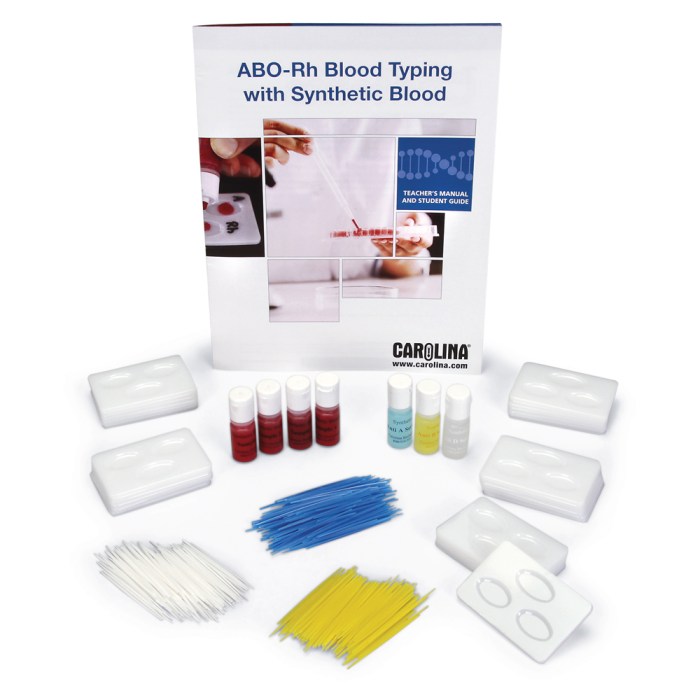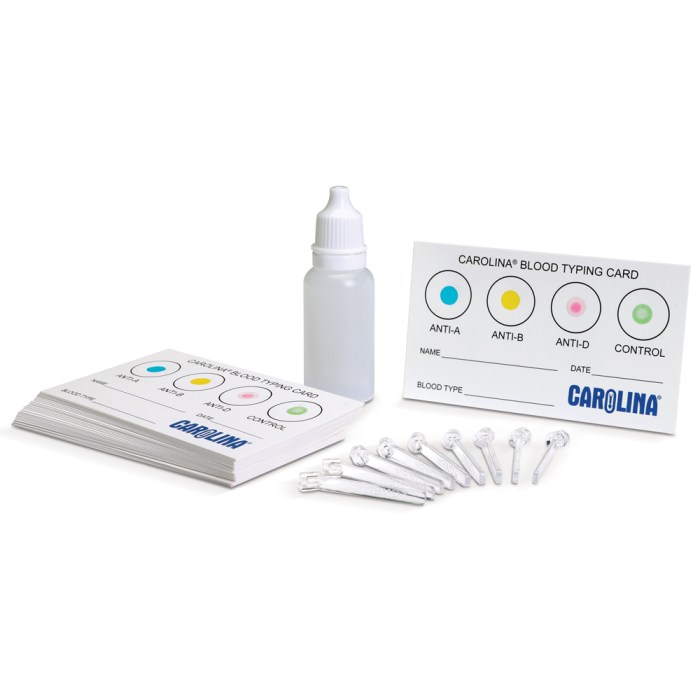Carolina Blood Typing Lab Answers: Embark on a journey into the fascinating world of blood typing, where the secrets of your genetic blueprint unfold. Carolina Blood Typing Lab unravels the complexities of blood types, empowering you with insights into your health and compatibility.
Delving into the nuances of blood typing methods, interpreting results, and exploring clinical applications, this comprehensive guide illuminates the significance of blood type information in medical decision-making and beyond.
Blood Typing Methods and Carolina Lab
Carolina Blood Typing Lab utilizes various blood typing methods to determine an individual’s blood type. These methods include:
- ABO Blood Typing:Determines the presence of A, B, and O antigens on red blood cells, resulting in blood types A, B, AB, or O.
- Rh Factor Typing:Identifies the presence or absence of the Rh factor antigen, classifying blood as Rh-positive or Rh-negative.
- Antigen Typing:Detects specific antigens on red blood cells, allowing for more precise blood typing and compatibility matching.
Carolina Blood Typing Lab offers a comprehensive range of blood typing tests, including:
- ABO and Rh Typing
- Extended Antigen Typing
- Antibody Screening
- Prenatal Blood Typing
Carolina Blood Typing Lab maintains high accuracy and reliability in its blood typing services through rigorous quality control measures and adherence to industry standards.
Interpreting Blood Type Results: Carolina Blood Typing Lab Answers

Blood type systems, such as the ABO and Rh systems, play a crucial role in determining blood compatibility and transfusion safety.
ABO Blood Type System:Individuals with type A blood have A antigens on their red blood cells, type B individuals have B antigens, type AB individuals have both A and B antigens, and type O individuals have neither A nor B antigens. Blood transfusions must match the recipient’s ABO type to avoid immune reactions.
Rh Blood Type System:Rh-positive individuals have the Rh factor antigen on their red blood cells, while Rh-negative individuals do not. Rh incompatibility can lead to hemolytic transfusion reactions or hemolytic disease of the newborn.
Understanding blood type compatibility is essential for safe blood transfusions and organ transplantation. Patients should consult with healthcare professionals to interpret their blood type results and determine their compatibility with potential donors.
Clinical Applications of Blood Typing

Blood typing has numerous clinical applications, including:
- Blood Transfusions:Matching donor and recipient blood types ensures compatibility and prevents transfusion reactions.
- Organ Transplantation:Blood typing is crucial for determining organ compatibility between donors and recipients.
- Prenatal Care:Blood typing can identify Rh incompatibility between mother and fetus, preventing hemolytic disease of the newborn.
- Forensic Investigations:Blood typing is used to identify individuals based on blood samples at crime scenes.
Carolina Blood Typing Lab’s services support these clinical applications by providing accurate and reliable blood typing information to healthcare professionals.
Quality Assurance and Standards
Carolina Blood Typing Lab maintains high standards of quality assurance through:
- Certified Personnel:All staff are trained and certified in blood typing techniques.
- Rigorous Protocols:Standardized operating procedures ensure consistency and accuracy.
- External Proficiency Testing:Participation in external proficiency testing programs verifies the accuracy of results.
- Compliance with Standards:Carolina Blood Typing Lab meets or exceeds industry standards and regulations, such as those set by the College of American Pathologists (CAP).
Strict quality control measures are essential for patient safety and ensure the reliability of blood typing results.
Patient Resources and Support
Carolina Blood Typing Lab provides patients with access to their blood type results through:
- Online Portal:Patients can view their results securely online.
- Printed Reports:Results are also available as printed reports.
For patients with questions or concerns, Carolina Blood Typing Lab offers:
- Customer Support:Dedicated customer service representatives are available to assist patients.
- Educational Resources:Carolina Blood Typing Lab provides educational materials to help patients understand their blood type and its implications.
Patients are encouraged to stay informed about the latest developments in blood typing and its clinical applications through Carolina Blood Typing Lab’s website and educational resources.
Essential FAQs
What methods does Carolina Blood Typing Lab use for blood typing?
Carolina Blood Typing Lab employs a range of methods, including serological testing, molecular testing, and genotyping, to ensure accurate and reliable blood typing results.
How can I access my blood type results from Carolina Blood Typing Lab?
Results can be accessed through the patient portal or by contacting the lab directly. Carolina Blood Typing Lab provides secure and confidential access to your medical information.
What is the significance of blood type compatibility in blood transfusions?
Matching blood types is crucial in blood transfusions to prevent adverse reactions. Carolina Blood Typing Lab ensures compatibility testing to guarantee safe and effective transfusions.